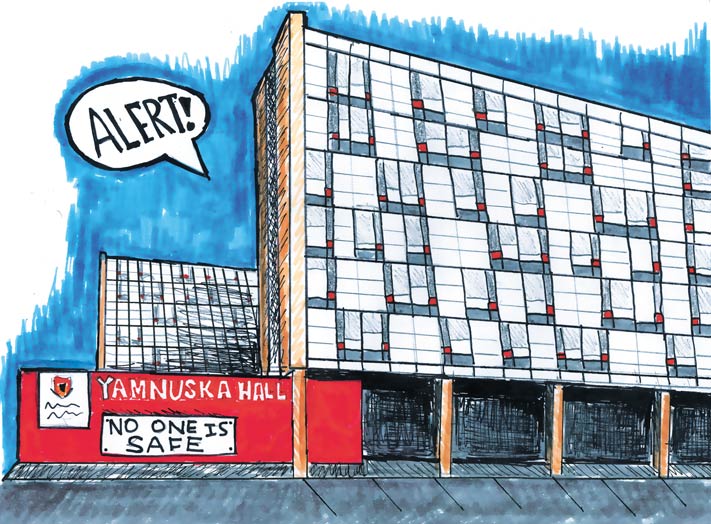
Security changes needed in residence
By Melanie Woods, March 12 2015 —
On Friday, March 6, I received an email security alert from Residence Services. It said an unknown intruder had broken into the apartment of three female students and left behind dozens of pairs of used underwear stolen from them and others.
One room in particular contained 75 pairs of worn panties left by the perpetrator. The email finished by claiming the police are investigating who the perpetrator could be and how they got into the apartment. After the security alert was issued, more students came forward with reports of missing underwear.
The details of the incident sound like a network crime drama. But the real kicker is that this crime didn’t happen the same day, week or even month as the alert. The incident occurred over Christmas break and was first reported to Residence Services and the RCMP on Jan. 9, 2015. But Residence Services didn’t let the rest of the students living in the building know until two months later.
This delay is alarming. Students often choose to live in residence because it’s supposed to be safer than the outside world. There are Community Advisors on call 24 hours a day, indoor bike storage and video surveillance. You need a key to get into the building, into each apartment and into each bedroom. All of these things are supposed to come together to create a safe environment. Overpriced residence fees are presumably justified by that sense of safety.
But in reality, anybody can get into the building if they follow behind someone with a key. There’s only one barrier to accessing Yamnuska Hall, and it’s a small plastic nub programmed to give access to my building, apartment and room. These layers of security are hardly impenetrable and once you trick the electronic key system, you’re in. And if the batteries in the doors stop working, even momentarity, the room is open.
Residence Services has said they will install deadbolts on the doors of the apartment that was entered, but they’ve made only fleeting mentions of enhanced security for the building’s other residents.
It’s the responsibility of Residence Services to ensure the safety and comfort of all students. This quick fix of a few deadbolts on one apartment isn’t going to solve the problem. It just means the perpetrator might move on to a different apartment next time.
When incidents like this occur, it’s also the responsibility of Residence Services to let those who could be affected know. We deserve to know when the safety we pay for is comprised. That’s what security alerts are supposed to do. Issuing an alert two months later doesn’t do anything but create retroactive worry.
I’m not saying we need to turn residence into an Orwellian surveillance state, or that Residence Services and the police are being purposefully incompetent. Nor am I saying that they should have immediately released the names and details of victims. But Residence Services could have handled the situation a lot better.
Waiting two months to send out the security alert is a gross oversight, and not having proper security measures beyond the fallible electronic key system in place is insulting to the students who pay for and rely on the security systems that residence provides.
This person is still out there. They have been for the past two months. I’d sleep a lot easier if I knew I could deadbolt my door at night. And I’d sleep better if I could have known the perpetrator was a threat in the first place.
